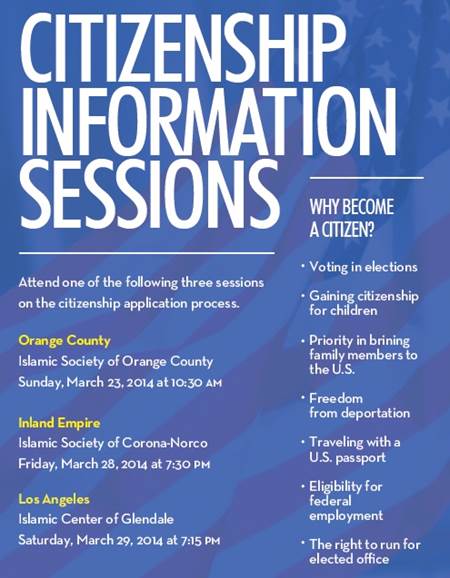
Citizenship Clinic to Follow
After attending an information session, those interested in applying for naturalization will receive information for CAIR-LA's upcoming Citizenship Clinic scheduled for Saturday, April 12, where specialized legal assistance on completing the naturalization application will be provided. In light of the forthcoming changes to the citizenship application process, which go into effect May 2, we encourage all eligible persons to apply now.
For details on the clinic, please call (714) 776-1177 or email the Immigrants' Rights Department at irdla@cair.com.
Aga Khan Urges Commitment to Pluralism
Providence, USA: The Aga Khan March 10 warned that the growing power of social media does not always mean more connection between people. He cautioned that the shallowness of the new media, intellectual isolation and mutual ignorance are adversely affecting relations between Islam and the West despite the highly interconnected world of today.
“More information at our fingertips can mean more knowledge and understanding,” he said. “But it can also mean more fleeting attention-spans, more impulsive judgments, and more dependence on superficial snapshots of events.”
“Fearful ignorance” must be replaced with “empathetic knowledge,” argued the Aga Khan, by ensuring a thoughtful, renewed commitment to the concept of pluralism and a strong civil society.
He made the remarks during the 88th Stephen A. Ogden Jr. ’60 Memorial Lecture on International Affairs that he gave at Brown University, as part of the college’s 250th anniversary celebrations.
The Aga Khan explained that civil society can assist in creating new governance frameworks as it has done recently in Kenya, Tunisia and Bangladesh, particularly when one understands that there can be no “one size fits all” answer, and the outcomes will be varied. “I believe that the voices of civil society can be among the most powerful forces in our time. Where change has been overdue, they can be voices for change. Where people live in fear, they can be voices of hope,” he said.
“A quality civil society”, said the Aga Khan, “has three critical underpinnings: a commitment to pluralism, an open door to meritocracy, and a full embrace of … a cosmopolitan ethic,” which he defined as “one that addresses the age-old need to balance the particular and the universal, to honor both human rights and social duties, to advance personal freedom and to accept human responsibility.”
Brown University President Christina Paxson introduced the Aga Khan – whose eldest son went to Brown – as “a returning friend of the University and a Brown parent.” She lauded the work of the Aga Khan Development Network (AKDN), saying that Brown recognizes and celebrates “the institutions and people throughout the world who champion fundamental values like the discovery of knowledge and the notion that knowledge is a globally shared source of strength.”
--
In his lecture the Aga Khan warned that a worsening knowledge gap between Islam and the West could become an empathy gap, making it harder to remain open to others. “The struggle to remain empathetically open to the Other in a diversifying world is a continuing struggle of central importance for all of us,” he said.
The Aga Khan said the knowledge deficit between civilizations – but also conflicts within them – have fueled strife across the world. “The harsh truth is that religious hostility and intolerance, between as well as within religions, is contributing to violent crises and political impasse all across the world, in the Central African Republic, in South Sudan and Nigeria; in Myanmar, in the Philippines and in the Ukraine, and in many other places,” he said.
He repeatedly emphasized what he saw as a “problem of fragmentation”, stating that diversity itself, should be a source of enrichment and that fragmentation comes when “diverse elements spin off on their own, when the bonds that connect us across our diversities begin to weaken.”
It is these forces of fragmentation that “can threaten the coherence of democratic societies and the effectiveness of democratic institutions.” For instance, the increasing conflict between Sunni and Shia Muslims in a number of countries around the world is “becoming an absolute disaster”.
|

